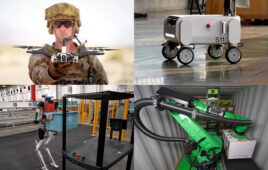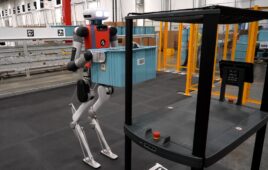|
Listen to this article
|

NEO is designed for household and other service uses. Source: 1X Technologies
Humanoids and artificial intelligence were the top stories in robotics last year, and that trend is continuing. 1X Technologies AS, formerly known as Halodi Robotics, today announced that it has raised $100 million in Series B funding to develop humanoid, general-purpose robots. The Moss, Norway-based company said it plans to use the new capital to bring its second-generation NEO android to market.
“We are thrilled that these leading investors are supporting 1X’s mission of safely deploying androids with smart behavior into new markets,” said Bernt Øivind Børnich, CEO of 1X, in a release. “Our next milestone will be scaling our data collection strategy for embodied AI and offering NEO to consumers.”
Founded in 2014, 1X said its goal is to produce safe systems that benefit society and meet global labor demand at a commercial scale. The company has developed the Revo1 servo motor, which it claimed had “the world’s highest torque-to-weight” ratio.
In 2020, 1X partnered with Everon by ADT International to deploy 150 to 250 androids for guarding U.S. commercial buildings at night. In 2022, the company partnered with ChatGPT creator OpenAI to develop embodied learning. Last year, 1X continued to build and train its EVE and NEO robots.
1X is teaching NEO to walk, handle household tasks
1X has designed the bipedal NEO to assist with a wide range of household tasks. Øivind Børnich replied to the following questions from The Robot Report:
What are some of the technical challenges that 1X will be addressing with this funding — bipedal locomotion, manipulation, and/or safe collaboration with humans?
Børnich: We will be focusing on training foundation models that encapsulates all these behaviors. With that being said, manipulation and safe collaboration are our main focus areas. While bipedal locomotion is often considered a resolved issue from an AI and software standpoint, and more of a hardware challenge, our approach integrates it with manipulation objectives.
The transition from wheel-based to bipedal locomotion in our humanoid robots is strategic. It aims to facilitate more efficient manipulation, especially in confined spaces like homes. In these environments, tasks often involve exerting significant force in limited areas, such as moving furniture, cleaning, or opening a fridge.
Bipedal design allows our robots to maneuver effectively in such spaces, utilizing their entire body. This includes abilities like shuffling sideways, bracing against surfaces, or leaning for balance and force application, all within a compact footprint.
Our focus isn’t just on walking; it’s about harnessing the full potential of the humanoid’s body for practical, efficient manipulation tasks. Moreover, ensuring safety in human-robot interactions is paramount.
As we advance, our goal is to enable our robots to exert considerable forces and perform complex tasks in tightly confined spaces, while maintaining a safe coexistence with humans.

1X CEO Bernt Øivind Børnich and EVE. Source: 1X Technologies
What kind of connectivity to the cloud will the NEO require to realize embodied AI?
Børnich: NEO will operate independently with embodied AI, functioning autonomously for most tasks. However, for advanced long-term reasoning and planning, it initially relies on external cloud-based models, like those from OpenAI. This means reduced functionality without cloud connectivity.
A standard broadband Internet connection suffices for this cloud interaction, ensuring NEO accesses its full capabilities when connected.
Is 1X focusing on offices, warehouses, or households first?
Børnich: Our EVE android is currently working in logistics and guarding. The initial focus with NEO will be on integrating into domestic environments, entering the consumer household market first.
What sort of data are you planning to collect?
Børnich: We want to collect egocentric locomotion and manipulation data, in addition to general dialogue and social interactions in a privacy-aware manner.
Our primary interest lies in data related to what we term manipulation — understanding how tasks are handled in an environment such as a home so that our androids can learn to use their bodies effectively for tasks in the sector they work.
Do you have partners for training the robot to do different tasks?
Børnich: Our androids’ Smarter Behavior is primarily trained by 1X operators using EVE in our studio for data collection. We will continue scaling for trained tasks and new skills as we increase our deployments into consumer and other new markets.
Currently, we have 20 androids in our studio actively collecting data, plus the EVEs deployed at the client site. Our team of 12 full-time operators helps the androids learn and refine various tasks. Drawing inspiration from the open-source AI community, our operators focus on training their own models and become the experts on how to get the most out of them.
This approach allows for rapid iteration, moving beyond the traditional model where only AI engineers handle training. Consequently, our AI engineers can concentrate on enhancing data quality and architecture, while the operators specialize in data efficiency and quality. This collaborative system enables us to optimize our training processes and improve the capabilities of our androids more effectively.

The EVE android trains to do different tasks at 1X’s lab. Source: 1X Technologies
How is NEO different from other androids or humanoid robots in development?
Børnich: NEO weighs 30 kg [66.1 lb.] and is 167 cm [65 in.] tall, about the average height of a human. It has the same range of motions as us, full dexterous hands, and it can lift 75 kg [165.3 lb.] in a deadlift or squat.
But what really makes NEO unique among humanoid robots is that it’s not an industrial machine. It’s soft like us, light, and inherently safe, with no pinch points or other hazards, which is crucial for us to pursue our vision of deploying safe and useful androids to consumers.
Investment quickly flows to androids
EQT Ventures and other global investors participated in 1X Technologies’ Series B round. The company completed its Series A funding round, led by OpenAI and Tiger Global, in March 2023. 1X noted that it has now raised over $125 million in less than 12 months.
As part of the latest round, 1X also facilitated a secondary transaction in which existing investor Sandwater increased its stake with the third-largest contribution to the round. Other secondary participants included new investor Samsung NEXT, as well as existing investors Skagerak Capital and the Nistad group.
“From Leonardo da Vinci to today’s sci-fi, humans have dreamt of humanoid robots for more than 500 years,” said Ted Persson, partner at EQT Ventures. “It’s a privilege to witness the enabling technologies form in front of our eyes, in real time.”
“The impact of androids joining our human workforce, on our terms will be transformative — to say the least,” he added. “We’re convinced 1X with their NEO androids will play a crucial role in the pioneering steps towards the first forays of our technological and human future.”






I would like to be a beta tester for one of these robots! How do I do that?